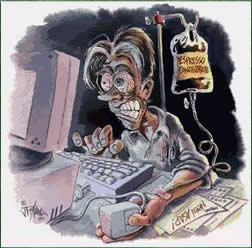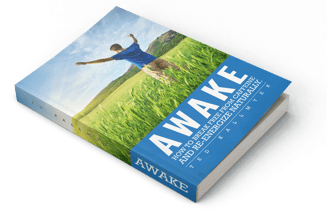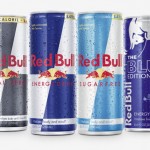Caffeine Addiction a Mental Disorder?
 Caffeine Addiction has not yet been classified as a mental disorder by the
Diagnostic and Statistical Manual of Mental Disorders (DSM-5).
Caffeine Addiction has not yet been classified as a mental disorder by the
Diagnostic and Statistical Manual of Mental Disorders (DSM-5).
Despite a lot of pressure from groups of doctors and health advocates, the latest version was released this year without the caffeine addiction disorder diagnosis.
However, this doesn’t mean that caffeine related problems were eliminated from the DSM-5 entirely. A couple disorders related to caffeine consumption were place in the manual by The American Psychiatric Association.
DSM-5 Caffeine Addiction Related Disorders
Both caffeine withdrawal and caffeine overdose did make it into the latest diagnostic manual. Here are the criteria for both.
Caffeine Overdose as a Mental Disorder
The official caffeine overdose diagnosis can be made as long as 5 of these overdose symptoms are present:
- Restlessness
- Nervousness
- Excitement
- Insomnia
- Flushed face
- Frequent urination
- Upset stomach, diarrhea
- Muscle spasms
- Fast and incoherent speech
- Irregular heartbeat
- Periods of inexhaustibility
- Psychomotor agitation
Caffeine Withdrawal as a Mental Disorder
Those withdrawing from caffeine can also be classified if they exhibit caffeine withdrawal symptoms such as:
- Headaches
- Constipation
- Lethargy
- Inability to concentrate
- Depression
- Muscle stiffness
See our complete list of caffeine withdrawal symptoms here.
Why Isn’t Caffeine Addiction Listed?
There’s pretty strict criteria for what makes it into the DSM-5 and caffeine addiction was most likely debated extensively. Based on what we know about caffeine, in the end, it probably wasn’t placed in the DSM-5 for the following reasons.
- Caffeine is consumed daily by billions of people worldwide with very little to no health consequences for the vast majority. We would estimate that less than a tenth of one percent of the world’s population have any adverse reactions to this drug.
- There is little to no evidence that caffeine is harmful to the human body when consumed in moderation or that it interferes with normal mental functioning and productivity.
- While caffeine does have addictive properties it doesn’t foster deep psychological and physiological dependency as do controlled addictive substances. People can generally detox from caffeine and function normally in a couple days without professional intervention.
This issue has been debated as far back as 2007 and most likely will continue to be debated by The American Psychiatric Association as they begin work on the DSM-6. For now, caffeine addiction isn’t yet classified as a mental disorder although many health professionals feel that it should be.
We can attest that there are some people, who at least on some level, can become pretty addicted to caffeine and we even put together a Caffeine Addiction Diagnosis Quiz, so people can determine just how addicted to caffeine they are.
Caffeine addiction is more about people’s need to increase their dosage as the body builds up tolerance to the chemical. Therefore, it takes more and more caffeine to produce the desired effects. In any event, caffeine addicts can’t be officially labeled just yet.
Caffeine Use Disorder
Caffeine use disorder isn’t yet in the DSM-5, but has recently gained some attention as the result of a study conducted by American University in Washington DC.
This caffeine disorder basically refers to someone that is unable to reduce or give up caffeine even though it may be contributing to negative outcomes like insomnia, anxiety, or heart conditions.
People may have Caffeine Use Disorder if they fit the following guidelines:
- Caffeine users suffer withdrawal symptoms if they try to quit.
- They are unable to reduce or quit their caffeine consumption.
- They have an underlying health condition that requires them to reduce or quit.
Professor Laura Juliano said the following about her co-authored study:
“There is misconception among professionals and lay people alike that caffeine is not difficult to give up. However, in population-based studies, more than 50 percent of regular caffeine consumers report that they have had difficulty quitting or reducing caffeine use.“
It will be interesting to see if Caffeine Use Disorder makes it into the next version of the DSM.

Get Help Quitting Caffeine
Reduce your caffeine intake without pain and discomfort.
Download our FREE ebook




